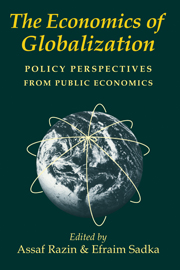Book contents
- Frontmatter
- Contents
- Preface
- List of Contributors
- Introduction
- I International Mobility of Technology
- II Capital Flows and Exchange-Rate Misalignment
- III Tax Incentives and Patterns of Capital Flows
- 4 Implications of the Home Bias: A Pecking Order of Capital Inflows and Corrective Taxation
- 5 Transfer Pricing as a Strategic Device for Decentralized Multinationals
- IV Limits to Income Redistribution in Federal Systems
- V Tax Harmonization, Tax Coordination, and the “Disappearing Taxpayer”
- VI Political-Economy Aspects of International Tax Competition
- VII Migration of Skilled and Unskilled Labor
- VIII Fiscal Aspects of Monetary Unification
- Index
4 - Implications of the Home Bias: A Pecking Order of Capital Inflows and Corrective Taxation
Published online by Cambridge University Press: 28 January 2010
- Frontmatter
- Contents
- Preface
- List of Contributors
- Introduction
- I International Mobility of Technology
- II Capital Flows and Exchange-Rate Misalignment
- III Tax Incentives and Patterns of Capital Flows
- 4 Implications of the Home Bias: A Pecking Order of Capital Inflows and Corrective Taxation
- 5 Transfer Pricing as a Strategic Device for Decentralized Multinationals
- IV Limits to Income Redistribution in Federal Systems
- V Tax Harmonization, Tax Coordination, and the “Disappearing Taxpayer”
- VI Political-Economy Aspects of International Tax Competition
- VII Migration of Skilled and Unskilled Labor
- VIII Fiscal Aspects of Monetary Unification
- Index
Summary
Introduction
Even though financial markets today show a high degree of integration, with large amounts of capital flowing across international borders to take advantage of rates of return and risk-diversification benefits, the world capital market is still far from the textbook story of perfect capital mobility. As an example of the limited degree of capital mobility, Tesar and Werner (1995) found that despite the recent increase in U.S. equity investment abroad (including investment in emerging stock markets), the U.S. portfolio remains strongly biased toward domestic equity. Likewise, Huberman (1997) reports evidence of “home bias” within the United States: American investors have a strong preference toward firms located in their states over out-of-state firms.
Capital immobility has been explained not only on the basis of capital controls but also on the basis of the informational problems associated with international investment. Because of adverse selection and moralhazard problems, real rates of return across countries are not fully equalized. Capital-market regulations and better rules of disclosure, as applied to information about the profitability of domestic firms, can alleviate some of these asymmetric information problems. The stationing of managers from the headquarters of multinational firms at their foreign direct investment establishments in the destination countries is one way to monitor closely the operation of such establishments, thus circumventing some of these informational problems.
It is well known that in a perfectly functioning world capital market, the efficient international tax principle is the residence principle. That is, foreign-source and domestic-source incomes of residents are taxed at equal rates, and nonresidents' incomes are fully tax-exempt.
- Type
- Chapter
- Information
- The Economics of GlobalizationPolicy Perspectives from Public Economics, pp. 85 - 122Publisher: Cambridge University PressPrint publication year: 1999
- 5
- Cited by



